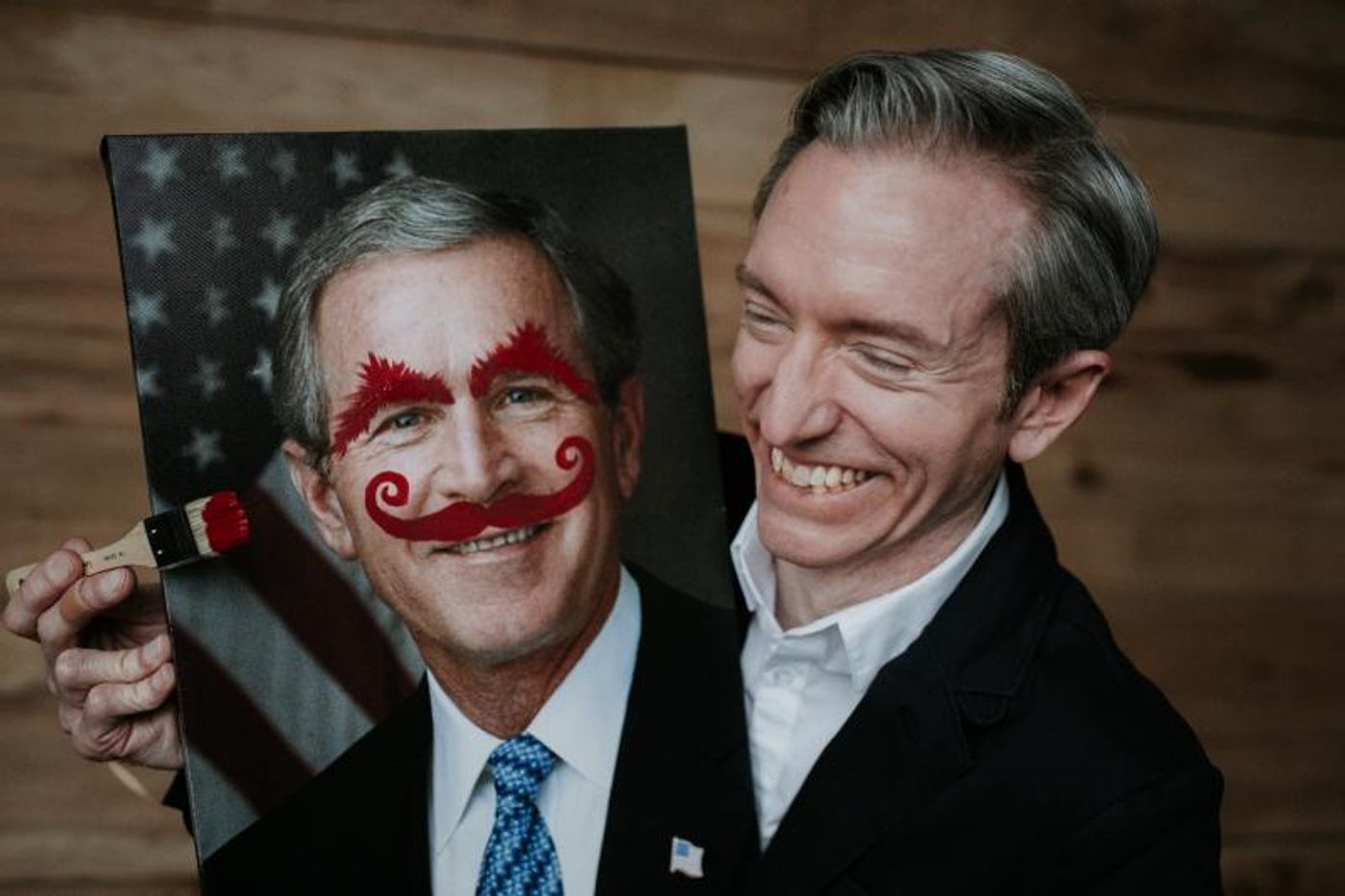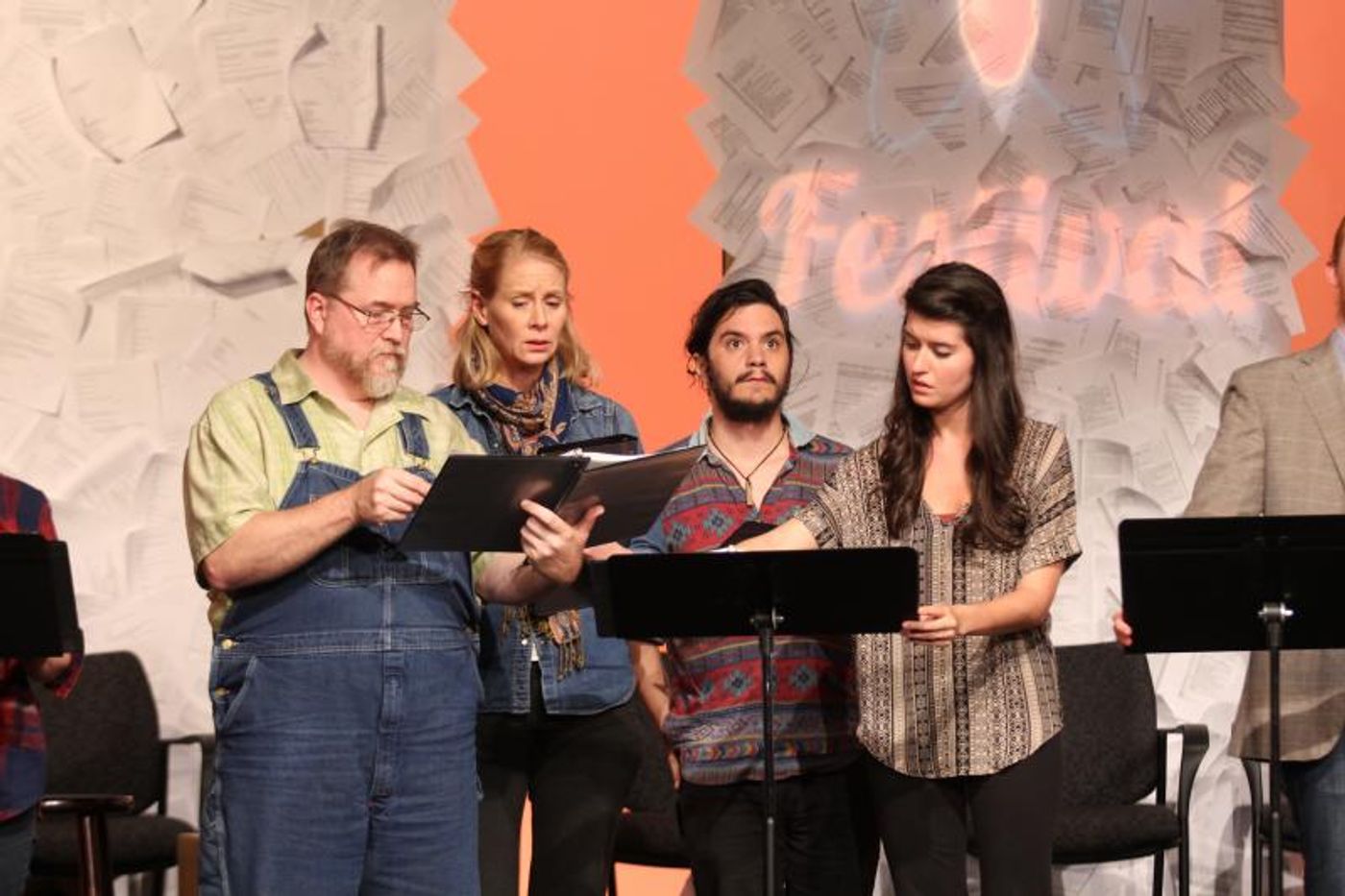INGRAM NEW WORKS FESTIVAL: Natalie Risk Interviews Nate Eppler About THIS RED PLANET

Natalie Risk interviews Nate Eppler - This Red Planet
Nashville Repertory Theatre's Ingram New Works Festival - Nashville's annual celebration of new plays and playwrights - returns to Music City May 9-19. The festival gives local audiences an opportunity to hear fresh work created by exciting new voices, while making new friends while connecting via new works for the theater.
After a year of interning with the Ingram New Works Project and watching this extraordinary squad of playwrights work their magic, I knew that they all have some seriously smart things to say about their plays. I was curious to hear more about their process and how they crafted these incredibly powerful stories. So, I interviewed them. And they so did not disappoint.
This Red Planet by Nate Eppler: A former US President wakes up one morning and decides to be an artist instead of a Republican - so the former First Lady enrolls him in private painting lessons with an art tutor hired specifically to discourage him.
Natalie Risk: Why this play now? What inspired you to write This Red Planet?
Nate Eppler: The best new plays are about what it means to live right now, in this moment. And this moment is intense, right? Suddenly I had to write about the election, and the Dunning-Kruger effect, and how some people only see what they want to see, and the dangers of projection, and how some men get a million opportunities to fail upward, and how that means that they leave a lot of rubble behind them as they tumble up the stairs, and how that often means a lot of women are expected to do a ton of invisible emotional labor while cleaning up the messes, and also that thing where Republicans seem super afraid of art for some reason. There wasn't really a Shakespeare play that I could remount that tackled all those issues, so I just had to go ahead and write a new play.
How has working with the Ingram New Works Project shaped your play? What are you most excited about in the other plays?
Okay so: my play is like a million times better because of being in the room with these knockout playwrights! Also, this year I have had the support of the Rep staff and interns, the impossibly awesome volunteers of the Ingram Super Team, and a seriously badass Ingram New Works intern to help shape my play. I mean, I'll take the credit it for it as always, but my play is better because of the people supporting me.
 And: I am excited about the yoga shapes and collisions of character in James's play PRANAYAMA, I am excited about the way the play breaks open into a series of beautiful postcards of wonderful moments in Cristina's play THE VERY LAST WISHES OF GRANPA JOE, OR MIA & HECTOR GO SIGHTSEEING, and I am excited about the way that expectation and terror and tension can suddenly turn into shocking horror or hilarious comedy (or, maybe most often, shocking comedy) in Tori's play HOW THE BABY DIED.
And: I am excited about the yoga shapes and collisions of character in James's play PRANAYAMA, I am excited about the way the play breaks open into a series of beautiful postcards of wonderful moments in Cristina's play THE VERY LAST WISHES OF GRANPA JOE, OR MIA & HECTOR GO SIGHTSEEING, and I am excited about the way that expectation and terror and tension can suddenly turn into shocking horror or hilarious comedy (or, maybe most often, shocking comedy) in Tori's play HOW THE BABY DIED.
Your play involves the idea of projection and how we define what is "good" art and what is not. Do you find that others see things in your plays that you didn't know were there? Do you find your work reveals things about yourself to you?
Damn, we're getting right to it, huh, Natalie? Okay. So: Yes. Definitely. Audience members have definitely told me they saw things in my work that I was blind to for a million different reasons. I honestly feel very privileged to have that experience. I am often not conscious of the ways my plays reveal things about me (and if I was, I probably wouldn't get up in the morning to write plays, right?) I have also had audience members tell me about things they saw in my work that definitely were not there. But that's kind of amazing, too. Once I share my play with you, it's yours, not mine. I don't get to tell you what you see.
You've written plays inspired by Tonya Harding [THE ICE TREATMENT] and now George W. Bush [THIS RED PLANET] - very controversial popular culture figures. What is it that draws you, as a writer, to begin with such recognizable personalities?
I've seen other writers that work with living figures describe it as a kind of stereoscopy. Putting a fictionalized version on top of the real version creates a dynamic tension that gives you a new view of the subject. I think that's definitely part of it, but I am also drawn to the modern mythical size of these stories. The tiny details of the real Tonya Harding will (sadly) not survive. An Olympian who injured another Olympian to win is a story bigger than Tonya. A Republican President who decided to become an artist is a story bigger than W. Culture is happening to us so fast that we aren't able to fully process the history we're in the middle of, and maybe it's always like that, but at this moment it feels like we miss a lot of the deeper emotional implications of these stories because we're so busy devouring the gossipy bits and details and moving on to the next one. There's no doubt these modern myths make us feel - I'm moving them into fiction so that I can interrogate why these stories resonate so strongly with us. Also, I think part of my process is to build characters that are as far away from me as possible (and those two are very far away from me) and then to look for connections there, to look for empathy. And I am always surprised by what I find.
Your play examines the patriarchy and the emotional weight carried by women. How has writing this play affected the way you experience gender dynamics?
Of course, it's everywhere. It's not that I am suddenly aware of it, but I am definitely cataloging it to bring it into the Lab to discuss in relation to the play. In particular, though: there is this weird social quirk - slash - terrible social construct where sometimes we will allow a complete neophyte, a total uneducated newbie moron, a huge amount of power, prestige, or influence precisely because they are not qualified. Because they are an outsider. Because they are completely new. This is insane. This is that thing where in movies all of a sudden, our only hope is a devil-may-care outsider with no regard for the rules who has a plan that just might be crazy enough to work. This is that thing where an outsider artist is suddenly lauded and celebrated for their "naïve art." This is that thing where a shockingly shallow and totally unprepared game show host becomes President. This weird social quirk - slash - terrible social construct only applies to dudes. No one ever says that sort of shit about women. Men get to try and fail. And fail. And fail. And fail. Women have to be experts to get that sort of power, prestige, or influence. It's ridiculous. And I'm seeing it everywhere right now.
If you could recreate any masterpiece of the visual art world, what would it be and why?
I would make a giant version of The Treachery of Images out of actual pipes. C'est dix mille pipes. Your move, Magritte.
 If you could go back and give yourself advice before you wrote the first word of this play, what would it be?
If you could go back and give yourself advice before you wrote the first word of this play, what would it be?
Go ahead and buy the extra dry-erase boards now. Breaking this particular story needs more room than you realize.
Nate Eppler's This Red Planet will be presented May 9 and 19 as part of the Ingram New Works Festival. To find out more and to reserve you seats, go to www.ingramnewworks.com.
About the playwright: Nate Eppler is a playwright and new play advocate currently serving as Playwright-in-Residence for Nashville Repertory Theatre. His plays include Long Way Down (Semi-Finalist Steinberg/ATCA New Play Award 2011), Larries, Good Monsters, and The Ice Treatment (Finalist Steinberg/American Theatre Critics Association New Play Award 2017, Winner 2017 M. Elizabeth Osborn New Play Award) His plays have been produced in New York City, Nashville, London, and Los Angeles. Eppler is a vocal advocate for new artists and new works in the American theatre with an emphasis on developing the creative capacity of his adopted hometown of Nashville. In addition to his work as a playwright, Eppler serves as director of the Nashville Repertory Theatre Ingram New Works Project, a nationally recognized and locally valued program designed to empower new voices in the American theatre with transformative support and expand the creative capacity of the city by connecting artists and audiences across extraordinary new works. He is a proud member of the Dramatists Guild of America. Eppler is represented by The Gersh Agency.Videos

